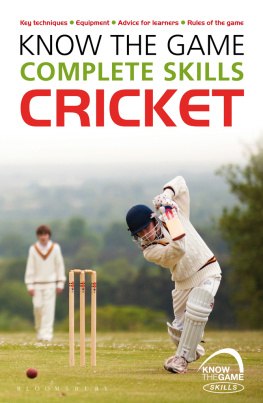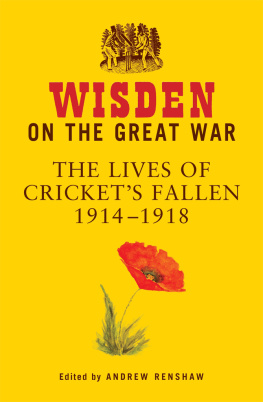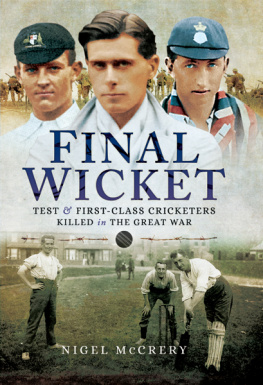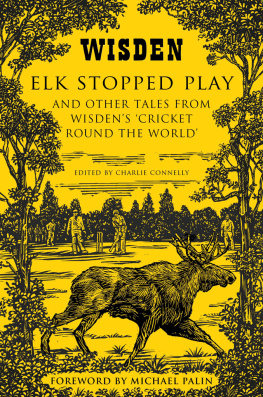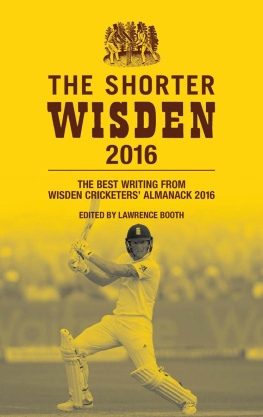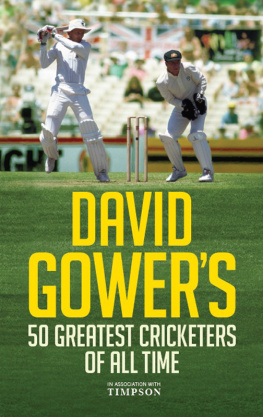Uniform with this Volume
DONTS FOR WIVES
DONTS FOR HUSBANDS
DONTS FOR DANCERS
DONTS FOR GOLFERS
DONTS FOR MOTHERS
DONTS FOR WEDDINGS
A. & C. BLACK, LTD

Cricket cannot be played successfully unless one has a sound constitution and a good physique. Given these two good allies and, if possible, a genuine enthusiasm for the King of Games, and a boy or youth may readily develop into a really good cricketer. The game must be played with earnestness, and the effort demanded is by no means an inconsiderable one. Rome was not built in a day, and normally speaking the good batsman or bowler is not a growth of yesterday.
DONTS FOR CRICKETERS
Dont stop cultivating the moral qualities that by necessity must have a place in such a great, glorious and unsurpassable game as cricket.
Dont believe any man who tells you that he does not know what nervousness in cricket is. It is common to all, in greater or lesser degrees. It is in the constitution, and cannot be got rid of by much, or any, reading.
Dont wrangle with or abuse the umpire. How would matches ever be finished satisfactorily if every batsman had a right to remain at the wicket until he thought himself fairly out?
Dont be superstitious.
Dont bowl with a long, loose or flapping sleeve in order to distract the batsmans attention. This is intrinsically unfair and unworthy of any true cricketer. Waving the arms behind the ball after it has been delivered is also manifestly unfair.
Dont grumble at the captains orders : the responsibility of managing a match is quite enough anxiety and trouble without being bothered by a mutinous eleven.
Dont be sulky or sad if your bowling is punished or your captain takes you off when you want to continue.
Dont lose your temper.
Dont move about in an aimless or fidgety manner.
Dont underestimate the virtue of patience.
Dont be disheartened by a month, or perhaps even a season, with very bad luck and a bad average. Comfort yourself with this reflection : not only have good players had these reverses, but even the very best. The mighty do sometimes fall.
Dont be afraid to follow your natural instincts.
Dont forget the motto of that famous old cricket club, I Zingari : Keep your promisekeep your temperkeep your wicket up.
Dont get nervous if you make a mistake.
Dont countenance any interference with the implements of cricket.
Dont be deceived. The batsman given out unluckily may look pleasant, but that is only one of the beneficent results of civilisation, for, as a matter of fact, he feels extremely bitter, and there are innumerable swords in his heart.
Dont abuse a batsman, no matter what rash stroke or foolish lack of judgement has cost him his wicket. Wait until the keen sense of vexation has somewhat subsided and a quiet word of advice may be given.
Dont play for yourself, play for your side. It is not the number of individual notches or wickets that falls to his lot which delights the true cricketer : it is the actual result of won or lost.
Dont dally in getting to the wicket : there is nothing so annoying as waiting for three or four minutes while some local swell calmly buckles his pads and saunters sleepily to the wicket.
Dont forget the axiom of Old Jupp : Take care of your wicket, and the runs will take care of themselves. That is very sound and excellent advice.
Dont under any circumstance fail to obey your captain cheerfully and promptly.
Dont regard drawn matches in any other but an unfavourable light. It is hardly worth beginning a match that cannot be finished in three fine days.
Dont lose sight of the chief principle that tends to harmonise the game, and make it the quiet English pastime that it is : the umpires decision shall be final.
Dont allow feelings to get the better of you and indulge in any open exhibition of anger against the umpire. A man who does that should never play cricket again until he has satisfied himself that, come what may, he will be able to curb himself sufficiently to prevent such exhibitions, which act so greatly against the true interests of the game.
Dont listen to outside praise ; this lets conceit and its enervating influence steal in. Be modest after victory.
Dont forget : cricket is but a game, and no moral disgrace will attach to you if you fail.
Dont bat too cautiously : it is like a timid man running away from danger instead of facing it as he should. It is better to try and to fail than not to try at all.
Dont fail to observe the two rules which ought to be hung in your bedroom and branded into your brain. Put the left leg over and Get on top of the ball.
Dont neglect to learn all the ways a batsman may be given out. The batsman who gets out in an untoward and unusual way usually feels himself to be a fool, and generally looks like one.
Dont attempt to play with a bat that is not well-balanced.
Dont be in two minds about how you are going to play the ball, for that way madness lies. Make up your mind.
Dont forget to stand still, or you will never make a player. It is a good plan for the young batsman to have his right leg pegged down if he cannot naturally stand still.
Dont play with a crooked bat. This must be avoided.
Dont wave your bat in the air while the bowler is preparing to deliver the ball. As often as not this is merely a sign of nervousness, and in any case it is not effective.
Dont regard straight and upright play as necessarily a gift of the gods. Indeed, it is true that many a good batsman does not cultivate the straight and upright stand at the wicket. Nevertheless, this attitude in meeting the ball is a thing to be aimed at.
Dont look at the bowler, look at the ball. Perhaps one of the reasons why W.G. Grace is so deadly to young cricketers is this : the batsman, seeing an enormous man rushing up to the wickets, with both elbows out, great black beard blowing on each side of him, and a huge yellow cap on the top of a dark swarthy face, expects something more than the gentle lobbed-up ball that does not come ; he cannot believe that this baby-looking bowling is really the great mans, and gets flustered and loses his wicket.
Dont strive to bat in an elegant or pretty fashion for its own sake. That which comes natural to you as a batsman is the style to follow.
Dont cut by moving the right foot, rather bring the left foot across the wicket. This is one of the most beautiful strokes in batting, and also one of the most difficult to execute properly.
Dont cut a ball that could possibly hit the wicket.
Dont fail to keep the ball down in driving, for you run a great risk of being caught. Of course, the high drive is an extremely pretty stroke.
Dont neglect the quick-footed drive, of which Mr G.L. Jessop is perhaps the most famous exponent. It is obtained by the striker running out of his ground till he gets to the pitch of the ball, and then driving it.
Dont neglect the advice of Dr Grace on the matter of the half-cock. When a player finds himself in two minds as to what he shall do, it is best to play a half-cock stroke, which means that the bat is merely held almost stationary somewhere between a back and a forward stroke rather over the popping-crease, and the ball is allowed to hit it.
Dont play the square-leg hit too early or too soon.
Dont discount the leg glance, which is far less tiring than the foregoing. To glance a good length ball which pitches on the leg stump or wide of it is very safe, but be careful how you make it off a straight or nearly straight ball.
Dont forget to watch the ball very closely when you pull or hook. The pull is one of the most useful, though not one of the most elegant, shots in the batsmans repertory. Pivot yourself on your right foot, and holding your bat horizontally smite the ball to the on-side.
Next page




